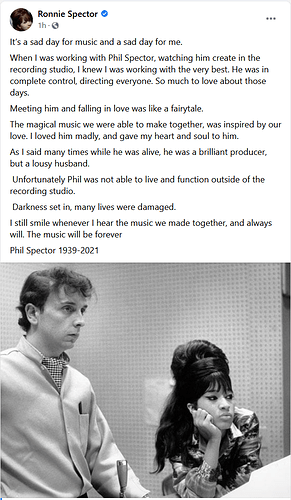Another case of having to separate the art from the artist.
It seems pretty clear that Phil Spector was suffering from untreated/poorly treated mental illness that continued to get worse and worse during the 30 years leading up to him committing murder. A whole lot of folks who should’ve spoken up, instead told “funny” Phil Spector stories and ostracized him instead.
I mean, the dude put a gun to Leonard Cohen’s chest. He pulled a gun on the Ramones. Both happened in recording studios. Those are the famous stories we know about. How many times and how many other people did he pull out a gun and aim at? It’s not an odd thing that he finally killed someone. The odd thing is that it didn’t happen any sooner.
And having said that, by all available evidence he still knew right from wrong when he shot Lana Clarkson dead.
Phil Spector was a piece of shit, and not only in the usual pretty-slimy music industry way. Spector wasn’t just egomanical, and he didn’t just screw people out of their money, though he did do those things. He was also abusive, controlling - he kept his wife and children prisoners in their home - and often used threats of violence.
All of this was well-known throughout the music industry decades before Spector murdered a woman in 2003 and was sent to prison for the rest of his life. Whenever a contemporary portrait of Spector in his prime in the mid-60s described him as an enfant terrible, rest assured that it’s the result of some decorous editor substituting that term for “piece of shit” in the source quotes.
But the impact his Wall of Sound had on the pop music of the early 60s is undeniable. However, Spector often is credited with the wrong things. There’s a myth, for example, that Spector was the one responsible for increasing the musical and production sophistication of rock-and-roll-based pop in the early '60s. To be brief, this is hooey: that sophistication predates Spector and is due to the many talented songwriters, producers, and engineers behind the Brill Building Pop and Atlantic Records scenes happening in New York City at the time.
Spector was born in the Bronx but had moved to LA as a child. In 1958 he had a hit as producer and writer with “To Know Him Is To Love Him.” Based on this success, he moved back to NYC, the center of the US pop music industry at the time. Spector served a whirlwind apprenticeship in NYC, working as a producer and songwriter at Altantic Records (he’s listed as one of the co-writers on Ben E King’s “Spanish Harlem,” for example.) Having learned much and made many contacts and even more enemies, Spector moved back to to LA in 1961 and started producing his best-known hit records there. These both established his own reputation independent of Atlantic and, as it happens, marked the start of the shift of the US pop music industry from east coast to west (along with the simultaneous rise of surf music.)
Spector’s approach was based on the Brill Building style, and he would use Brill Building songwriters for many of his hits. However, his best-known records didn’t elaborate on the style, but rather simplified it. If Being blunter: Spector turned the volume up, dumbed the style down, and marketed it to a younger audience to increase sales.
Spector’s girl group records are a good example. The first mega-smash girl group record was 1961’s “Will You Love Me Tomorrow?” performed by the Shirelles and written by Gerry Goffin and Carole King. It’s a prime example of the Brill Building sound and a thoughtful reflection on the realities facing teenaged girls; you can imagine its audience as being 15-17 years old.
Spector’s take on the girl group was to create a simplified, intensified, purified version of this and aim it at a younger audience - teeny boppers as they were termed at the time. The result was records like 1963’s “Be My Baby” by the Ronettes. The iconic hook is a simple but massively amplified drumbeat: the lyrics are an equally simple message of adoration.
On upbeat songs, Spector’s Wall of Sound was distinctive and catchy, but also as subtle as a sledgehammer. This could often work against it: Spector’s famously overproduced 1966 flop, Ike and Tina Turner’s “River Deep Mountain High” made the mistake of thinking that Tina Turner’s commanding voice needed the same amount of backup support Ronnie Spector’s did.
One thing Spector doesn’t get enough credit for, though, is the shimmering, ethereal sound he achieved on many slower songs, starting with the Paris Sister’s “I Love How He Loves Me” in 1961. The expression of this style that is best known today is his production of John Lennon’s “Imagine.” Though people today tend to block out the fact that Spector had anything to do with that song, understandably not wanting to taint the message by association with the man.
BBC’s Arena programme has an outstanding documentary that was filmed after Lana Clarkson was shot but before he was convicted that I can’t recommend enough.
https://www.youtube.com/watch?v=ySERXqYSfv8
Genius and madness personified. Awful, awful person, but my god, the music.
I echo the duality already expressed here. Not much more to say except that “Christmas (Baby Please Come Home)” is one of those tracks I could listen to all day.
Well that’s a tough testimonial to top.
